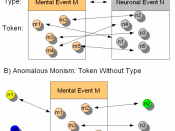Philosophy of Mind in China Conceptual and Theoretical Matters Historical Developments: The Classical Period Historical Developments: Han Cosmology Historical Developments: The Buddhist Period Historical Developments: The Neo-Confucian Period Bibliography Introduction: Conceptual and Theoretical Matters Classical Chinese theory of mind is similar to Western "folk psychology" in that both mirror their respective background view of language. They differ in ways that fit those folk theories of language. The core Chinese concept is xin (the heart-mind). As the translation suggests, Chinese folk psychology lacked a contrast between cognitive and affective states ([representative ideas, cognition, reason, beliefs] versus [desires, motives, emotions, feelings]). The xin guides action, but not via beliefs and desires. It takes input from the world and guides action in light of it. Most thinkers share those core beliefs. Herbert Fingarette argued that Chinese (Confucius at least) had no psychological theory. Along with the absence of belief-desire explanation of action, they do not offer psychological (inner mental representation) explanations of language (meaning).
We find neither the focus on an inner world populated with mental objects nor any preoccupation with questions of the correspondence of the subjective and objective worlds. Fingarette explained this as reflecting an appreciation of the deep conventional nature of both linguistic and moral meaning. He saw this reflected in the Confucian focus on li (ritual) and its emphasis on sociology and history rather than psychology. The meaning, the very existence, of a handshake depends on a historical convention. It rests on no mental acts such as sincerity or intent. The latter may accompany the conventional act and give it a kind of aesthetic grace, but they do not explain it. Fingarette overstates the point, of course. It may not be psychologistic in its linguistic or moral theory, but Confucianism still presupposes a psychology, albeit not the familiar individualist,



Okay
could be an interesting essay but i couldnt finish it due to the facts that there were no paragraphs in it, so it looked like just one big block of information which isnt very appealing to a reader.
1 out of 1 people found this comment useful.